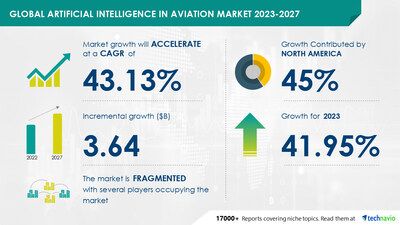Artificial Intelligence in Aviation Market size is set to grow by USD 3.64 billion from 2023-2027, Increasing use of AI for quicker check-in and baggage screening in aviation industry boost the market, Technavio
Press Releases
May 27, 2024
NEW YORK, May 27, 2024 /PRNewswire/ — The global artificial intelligence in aviation market size is estimated to grow by USD 3.64 billion from 2023-2027, according to Technavio. The market is estimated to grow at a CAGR of 43.13% during the forecast period.
For more insights on the forecast market size and historic data (2017 – 2021) – Request a sample report!
|
Artificial Intelligence In Aviation Market Scope |
|
|
Report Coverage |
Details |
|
Base year |
2022 |
|
Historic period |
2017 – 2021 |
|
Forecast period |
2023-2027 |
|
Growth momentum & CAGR |
Accelerate at a CAGR of 43.13% |
|
Market growth 2023-2027 |
USD 3.64 billion |
|
Market structure |
Fragmented |
|
YoY growth 2022-2023 (%) |
41.95 |
|
Regional analysis |
North America, Europe, APAC, South America, and Middle East and Africa |
|
Performing market contribution |
North America at 45% |
|
Key countries |
US, China, Germany, UK, and France |
|
Key companies profiled |
Advanced Micro Devices Inc, Airbus SE, Garmin Ltd., General Electric Co., Intel Corp., International Business Machines Corp., Iris Automation Inc., Lockheed Martin Corp., Microsoft Corp., MINDTITAN OU, Mphasis Ltd., Neurala Inc., Northrop Grumman Corp., NVIDIA Corp., Paladin AI, Samsung Electronics Co. Ltd., Searidge Technologies, TAV Technologies, Thales Group, and The Boeing Co. |
Market Driver
The global AI in aviation market is experiencing a notable surge in advancements and innovations. Microsoft’s Project AirSim, a comprehensive autonomous flight platform, is a prime example. This Azure-based system uses high-fidelity simulation for creating, training, and testing autonomous aircraft, generating vast amounts of data for AI model training.
Key areas of development include technology, hardware, services, software, virtual assistants, dynamic pricing, surveillance, flight operations, training, computer vision, system efficiency, security concerns, skilled labor, analysis of data, baggage screening, passenger identification, maintenance, customer support, facial recognition, fuel efficiency, productivity, pilot efficiency, radio channels, wind forecasts, position information, investment pockets, aerospace, cloud-based technologies, and the airlines industry.
Market Challenges
- Artificial Intelligence (AI) is transforming the aerospace sector, including cloud-based technologies, airlines, airports, and airways. AI-based chatbots are being utilized in air traffic control for software and service segments. Tata Power, Autogrid, SparkCognition, and SkyGrid are pioneering AI technology in air transport, enhancing customer service and profitability.
- AI-based software ensures flight safety and security, with vision-based AI and speech recognition processing sensor data. Capital investments in AI technologies are crucial for executives, requiring data triangulation and anomaly detection for system resilience. Smart twins and simulations offer greener operations and optimize ATC centers.
Research report provides comprehensive data on impact of trend, driver and challenges – Request a sample report!
Segment Overview
- Component
- 1.1 Software
- 1.2 Hardware
- 1.3 Service
- Application
- 2.1 Airline
- 2.2 airport operations
- 2.3 Manufacturing
- 2.4 MRO activities
- Geography
- 3.1 North America
- 3.2 Europe
- 3.3 APAC
- 3.4 South America
- 3.5 Middle East and Africa
1.1 Software- In the aviation industry, the Artificial Intelligence (AI) market is segmented into various components, including hardware, software, services, and technology. Capital investments in AI technology are significant for executives in airlines, driving innovation and efficiency. Flight operations benefit from AI through optimization software, which uses machine learning algorithms for dynamic pricing, fuel efficiency, wind forecasts, and position information.
Anomaly detection and system resilience are crucial components of AI-driven maintenance, minimizing downtime and operational disruptions. AI also enhances air traffic management, with controllers utilizing predictive analytics and simulations for airspace utilization and congestion reduction. Chatbots and virtual assistants, powered by AI and machine learning, offer real-time customer support, streamlining passenger interactions and enhancing productivity.
Furthermore, AI technology is employed in greener operations, such as baggage screening, passenger identification, and facial recognition, ensuring system efficiency and addressing security concerns. Skilled labor is essential for the analysis of data and the implementation of AI systems, making investment pockets in training and upskilling a priority.
For more information on market segmentation with geographical analysis including forecast (2023-2027) and historic data (2017-2021) – Download a Sample Report
Research Analysis
The Artificial Intelligence (AI) market in Aviation is experiencing significant growth, with applications ranging from Air Traffic Control (ATC) to chatbots for customer service in the Airlines industry. Cloud-based technologies enable the implementation of AI-based solutions, such as machine learning algorithms for anomaly detection and system resilience.
AI is used to enhance air traffic control systems, improving efficiency and reducing the risk of errors. Smart twins, virtual replicas of physical assets, are utilized for simulations and greener operations, optimizing fuel consumption and reducing carbon emissions. AI-driven chatbots offer executives real-time data triangulation, enabling informed decision-making in the complex aviation environment. Overall, AI is transforming the Aviation sector, enhancing safety, efficiency, and sustainability.
Market Research Overview
The Artificial Intelligence (AI) market in aviation is experiencing significant growth due to the integration of advanced technologies in the industry. AI technologies such as machine learning, natural language processing, and computer vision are being used to enhance various aspects of aviation, including flight operations, maintenance, and passenger experience.
These technologies enable real-time data analysis, predictive maintenance, and automated decision-making, leading to improved efficiency, safety, and customer satisfaction. Furthermore, AI is being used to optimize fuel consumption, reduce emissions, and minimize delays, making aviation more sustainable and cost-effective. The future of aviation lies in the integration of AI and automation, with the potential to revolutionize the industry and create new business opportunities.
Table of Contents:
1 Executive Summary
2 Market Landscape
3 Market Sizing
4 Historic Market Size
5 Five Forces Analysis
6 Market Segmentation
- Component
- Software
- Hardware
- Service
- Application
- Airline
- Airport Operations
- Manufacturing
- MRO Activities
- Geography
- North America
- Europe
- APAC
- South America
- Middle East And Africa
7 Customer Landscape
8 Geographic Landscape
9 Drivers, Challenges, and Trends
10 Company Landscape
11 Company Analysis
12 Appendix
About Technavio
Technavio is a leading global technology research and advisory company. Their research and analysis focuses on emerging market trends and provides actionable insights to help businesses identify market opportunities and develop effective strategies to optimize their market positions.
With over 500 specialized analysts, Technavio’s report library consists of more than 17,000 reports and counting, covering 800 technologies, spanning across 50 countries. Their client base consists of enterprises of all sizes, including more than 100 Fortune 500 companies. This growing client base relies on Technavio’s comprehensive coverage, extensive research, and actionable market insights to identify opportunities in existing and potential markets and assess their competitive positions within changing market scenarios.
Contacts
Technavio Research
Jesse Maida
Media & Marketing Executive
US: +1 844 364 1100
UK: +44 203 893 3200
Email: [email protected]
Website: www.technavio.com/
![]() View original content to download multimedia:https://www.prnewswire.com/news-releases/artificial-intelligence-in-aviation-market-size-is-set-to-grow-by-usd-3-64-billion-from-2023-2027–increasing-use-of-ai-for-quicker-check-in-and-baggage-screening-in-aviation-industry-boost-the-market-technavio-302155781.html
View original content to download multimedia:https://www.prnewswire.com/news-releases/artificial-intelligence-in-aviation-market-size-is-set-to-grow-by-usd-3-64-billion-from-2023-2027–increasing-use-of-ai-for-quicker-check-in-and-baggage-screening-in-aviation-industry-boost-the-market-technavio-302155781.html
SOURCE Technavio




